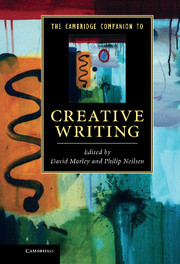Book contents
- Frontmatter
- 1 Introduction
- PART I GENRES AND TYPES
- PART II TOPICS
- 11 Serious play: creative writing and science
- 12 Outside the academy
- 13 Contemporary publishing
- 14 Imaginative crossings: trans-global and trans-cultural narratives
- 15 Does that make sense? Approaches to the creative writing workshop
- Further reading
- Other titles in this series
- Index
12 - Outside the academy
from PART II - TOPICS
Published online by Cambridge University Press: 28 March 2012
- Frontmatter
- 1 Introduction
- PART I GENRES AND TYPES
- PART II TOPICS
- 11 Serious play: creative writing and science
- 12 Outside the academy
- 13 Contemporary publishing
- 14 Imaginative crossings: trans-global and trans-cultural narratives
- 15 Does that make sense? Approaches to the creative writing workshop
- Further reading
- Other titles in this series
- Index
Summary
University Creative Writing Course seeks published writer.
It starts, like many modern dilemmas, with a line from a specialist website. You are a writer of prose fiction or nonfiction, or possibly a playwright or a poet, and you subscribe to jobs.ac.uk or the Higher Education Chronicle or www.unijobs.com.au. You too are desperately seeking something. You want to make ends meet, and answering this ad may be the structural breakthrough your life as a writer needs, the beginning that leads to the middle and the happily-ever-after.
There is, however, a snag. This is not a transaction without complications. You set out, perhaps some time ago, ambitious to be a writer. You're now about to apply for a job as a teacher.
Me. I am. I want to describe my thinking when I applied for a University Creative Writing post at the end of 2008. I'd published four novels and three books of nonfiction, all with mainstream houses, but was yet to be distracted by extravagant sales or the glittering prizes. My books, which in the dread phrase of Iain Sinclair seemed pre-forgotten, turned out to have a secondary value as the job-specific ‘proven track record of publication’.
Academic institutions offer writers another chance. The writer–teacher John Gardner, in his essential The Art of Fiction, argues that ‘every true apprentice writer has, however he may try to keep it secret even from himself, only one major goal: glory’.
- Type
- Chapter
- Information
- The Cambridge Companion to Creative Writing , pp. 171 - 180Publisher: Cambridge University PressPrint publication year: 2012

